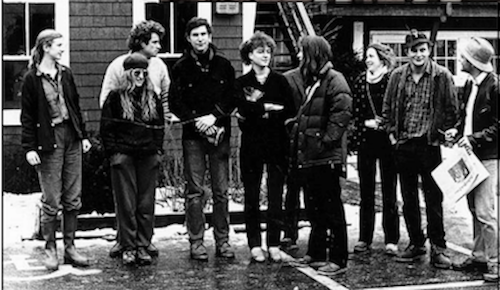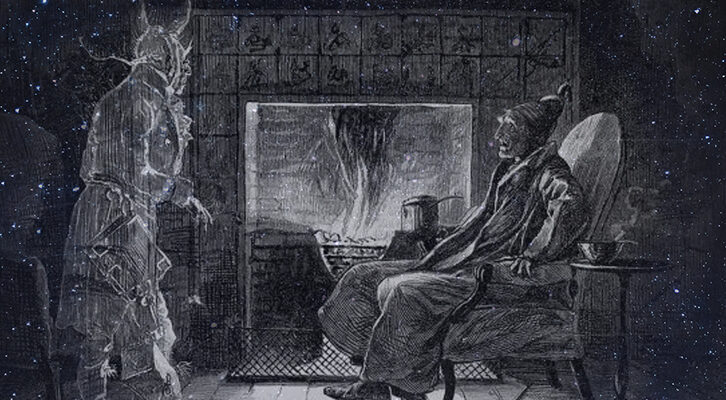Remembering Denis Johnson: “Anything is Possible and It Could Be Extraordinary”
Jim Shepard, Joy Williams, and More on One of the Best Writers of His Generation
On May 24, 2017, Denis Johnson, one of the great writers of his generation, died. We asked a few of his colleagues, friends, and former students to share their thoughts on what he meant both to the people who knew him, and to American letters.
__________________________________
Jim Shepard
Every writer I know has been stricken by the news of Denis Johnson’s death. And given the inadequacy of any possible response to a loss like that, maybe Margot Livesey’s reaction, in an email, has seemed to best get to the heart of the matter. She wrote: “How could this be? No more of those sentences.”
Those sentences! People will be sharing their favorites for years to come, in any number of forums. Jesus’ Son for so many of us is a compendium of favorite sentences. But you can reliably turn up others, equally dazzling and disarming, in any of Denis’s other books. For instance, these two, from the very opening of Fiskadoro: “Here, and also south of us, the beaches have a yellow tint, but along the Keys of Florida the sand is like shattered ivory. In the shallows the white of it turns the water such an ideal sea-blue that looking at it you think you must be dead, and the rice paddies, in some seasons, are profoundly emerald.”
My consciousness of Denis goes back to 1982 and The Incognito Lounge, and then the following year when we not only shared an editor at Knopf but had our first novels coming out within a month of one another. That shared editor, Robert Gottlieb, called me one day to tell me that I had to change the title of my novel. I asked why, and he said that he had another young writer whose first novel was also called Angels, and it wasn’t going to work to have two novels called Angels coming out within a month of one another in the same catalog. And I said to him, “Well, why do I have to change my title?” And Bob said, “Because Denis’s title is an excellent title. Yours is a mediocre title.”
Bob was right. Denis spent his life writing about our better angels, in about as oblique, and earned, a way as anyone could imagine. He was our master of rendering moments of psychological nakedness so palpable that the comic and the piteous, the appalling and the transcendent, were made to lie down together. He never ceased to remind us that somewhere inside that self that we presented to the world—that self that we knew so often disheartened others—there was that person we wished the world could know; that person we wished that we ourselves could more consistently glimpse.
His work and worldview embodied for me two insights about writing that I’ve always cherished: W.H. Auden’s “There is only one thing that all poetry must do. It must praise all it can for being and for happening,” and Richard Hugo’s “For the duration of the poem, I become a man sufficiently honest to warrant my own approval.”
At the end of Denis’s beautifully titled Angels, one of its protagonists, who has managed to land himself in the gas chamber, has, inside the chamber, as his next-to-last recorded thought, this:
He was in the middle of taking the last breath of his life before he realized he was taking it. But it was all right. Boom! Unbelievable! And another coming? How many of these things do you mean to give away? He got right in the dark between heartbeats, and rested there. And then he saw that another one wasn’t going to come. That’s it. That’s the last. He looked at the dark.
And then as his last recorded thought, he has this: “I would like to take this opportunity to pray for another human being.” More than any of his contemporaries, Denis Johnson illuminated how even the most damaged of us might come to embrace such an opportunity.
__________________________________
Joy Williams
Denis was huge—a huge and singular talent. And it was always Denis, not Denis Johnson. We knew of whom we spoke. So what do you do when you love meaningful literature and one of your lions has walked on? And too soon, too awfully soon… You go to the work. My favorite is the incomparable Fiskadoro with its refrain of real life real life for even dying is real life. But there is the monumental Tree of Smoke with its superb ending and the perfect little novella Train Dreams with its perfect ending. Denis had an eye for the broken soul and the unruly spirit. In his poem “Vespers” he speaks of “a top quality and rock-bottom heart.” This too was his, the lion’s.
__________________________________
Samuel Messer
FEAR NOT are the words inscribed across the pinnacle of James Hampton’s “Throne of the Third Millennium.” In 1982, D.J. and I drove from Florida to the Smithsonian in Washington, DC to see the Throne. D.J. had become obsessed with the Throne, after hearing me describe it as one man’s visionary sculpture of his dialogue with God, and he insisted we stop in Ellery, S.C. Hampton’s birthplace. At the Stop-n-Go on the corner of Hampton Street, D.J. asked everyone if they had ever heard of the artist, James Hampton, but no one had.
When at last we arrived at the Smithsonian and D.J. finally saw the Throne, which had been consuming him, he said, “I couldn’t take it all in, and I was a little frightened.” The whale-sized gold-and-silver tinfoil sculpture, Hampton’s lifelong work about redemption created all alone in his garage, brought D.J. to his knees. That night in the motel, D.J. began writing the poem in the bathtub. Later, he bolted up in his bed. “I have to go home right now,” he said. “It was too much for me.” So I drove him to the airport and as he got out of the car, he snapped his fingers and said, “Fear not.” Five years later he finished the poem.
D.J. always said he never would have been able to put his words and feelings on the page if not for his wife Cindy Lee Johnson. “…and the dance floor burns around two lovers whom nothing can touch—no, not even death!”
Written on the wall in my studio is something D.J. once said to me on the phone. “Anything is possible and it could be extraordinary.”
 Denis Johnson (far right, ignoring camera) next to Sam Messer in 1981, Provincetown.
Denis Johnson (far right, ignoring camera) next to Sam Messer in 1981, Provincetown.
__________________________________
Kirsten Bakis
That world! These days it’s all been erased and they’ve rolled it up like a scroll and put it away somewhere. Yes, I can touch it with my fingers. But where is it?
The winter of 1993-1994 was so cold in Iowa City right after Christmas break. I hadn’t wanted to return from New York, where I’d had a home, a boyfriend, an apartment we shared. That had all exploded, but I still thought maybe I could piece it back together. Meanwhile through the cracked walls of that old life, painful light began to shine in. I felt it on the plane reading Jesus’ Son in one sitting: the tiny stories with their aching poetic strangeness. I was preparing to take Denis Johnson’s workshop. In Iowa, everything looked flimsy and fake, like a curtain behind which the real world—New York, my actual life—lay hidden.
On the afternoon of our first class, the temperature was 15 below, with a windchill 30 degrees lower. There was talk on the radio of the dangers of exposing skin to the air. But we all went into the English-Philosophy Building. It seemed we never skipped classes at the Writers’ Workshop: with only four semesters, every hour felt important, even to someone who didn’t want to be there.
Denis asked us to introduce ourselves, and while we talked, the lights went out. The sky outside the window was suddenly visible: dark purple. Everybody went silent, surprised, and then after a moment Denis went on talking in the dark.
I emailed Alexander Chee about it this afternoon, because he was there too: “The generators had failed campus wide. We could feel the room cooling, or I could. When we left eventually it was because it would be too hard to get home if we stayed longer. And the attendants left the parking lot arm up after they went home as there was no power to get us to pay or to even keep us in. It felt like class during an apocalyptic disaster,” he said, “but in the nicest possible way.”
I remember that as Denis went on, he talked about how when he’d been a student there himself, he’d wanted badly to quit the program. “If you feel that way, don’t,” he said. “Stay.” What prompted him to say that? It felt like he was talking directly to me across the dark table, though there was no way he could have known what I was feeling.
Maybe it was just that sense of disaster Alex remembers. Even on ordinary days, and in all his writing, Denis seemed to be speaking from the brink of a destroyed world, one he could see behind the thin veil of this one.
That memory stands for him, for Denis, in my mind: an afternoon on the edge of possible apocalypse, in a slowly chilling classroom where I didn’t want to be, with a group of strange, passionate people, and Denis calmly leading class in the dark, as if that’s just the way things are. And urging us to stay, almost as if he knows someday we might look back and think we’d give anything to sit at that table again.
__________________________________
Chris Adrian
At the end of my first year of graduate school, I was in a literature class taught by Denis Johnson. It was a “form” class, meaning we were there not so much to read books as junior literary critics but to experience them as young writers, or (more importantly) to experience the instructor’s experience of the book—the idea was to teach us to read like writers by having us read with writers. Like almost everyone else in my class, I worshipped Jesus’ Son, but I was terrified of it, too. And I was terrified of Denis, though he was affable, scruffy, and kind. Most of what I remember from the class is a feeling of exalted anxiety and very much not wanting to be noticed by him. I remember next to nothing of what we read or talked about. But at some point someone braver than me said something to him that was tantamount to asking him why he wrote, and I have never forgotten how he answered. “I want to be Shakespeare,” he told us. “You should all want to be Shakespeare, too.”
__________________________________
Christian Kiefer
I was a fan first. Jesus’ Son alone would have cemented his reputation for all time. In fact, I will maintain to my dying day that “Car Crash While Hitchhiking” is the greatest piece of short fiction ever written, a creation so singularly perfect that it is difficult for me to believe that it came from the mind and heart of a human being (and maybe it did not). But there are others too: the marvelously comic noir Nobody Move, the post-apocalyptic beach novel Fiskadoro, the staggeringly lovely Train Dreams, which I read in its entirety aloud to Pam Houston during a late-night drive over the spine of the Rockies. So much greatness in one man’s heart.
And what kindness in his soul, in friendship and grace. To think that he put up with so many interminable questions from me as I grilled him (and, by proxy, his wife Cindy) on the particulars of life in North Idaho for my novel The Animals. Here’s a piece of that exchange which will tell you all you need to know:
Hi DJ:
I wondered if you might tell me a bit about the start of the big winter of ’96 from your recollection. The whole end of the book takes place during the first week or so of the storm, which started a bit less than 2 weeks before Thanksgiving and (as you know) basically didn’t stop for 2 months. My understanding is that it snowed a couple of feet and then there was an ice storm and then it snowed a couple more feet, which meant something like 4-5 feet of snow in 4 days with a layer of ice in between. Do you recall that at all? Curious about loss of electricity/phone service there during big storms like that.
All right, leaving you alone again now.
best,
Christian
P.S. In the home stretch of this draft. 3 chapters left then I’ll have a complete draft to rewrite a dozen times.
_______
Dear Christian,
Now, here you are trying to be accurate and factual again, when I thought we’d got you on the road to a cure. I think I’m going to have to recommend stronger measures: Throw away all your research, every shred of it, and make a firm resolution to tell at least one lie per day to at least one person you truly love for 90 days. When you’ve lost all ability to distinguish the true from the false, when you’ve estranged all humanity, when you’ve shrunk your soul to a dot of ugliness whose only hope is to be its own God and Creator, you’re ready for page 1. Facts begone!
DJ
And now I’m going to quote you again, you strange and wonderful creature:
“It was raining. Gigantic ferns leaned over us. The forest drifted down a hill. I could hear a creek rushing down among the rocks. And you, you ridiculous people, you expect me to help you.”
It’s enough to break all our hearts at once and put them back together anew. Thank you for helping me and for helping us all. We ridiculous people thank you for it. God bless you, my friend, on and on into whatever’s to come.




















